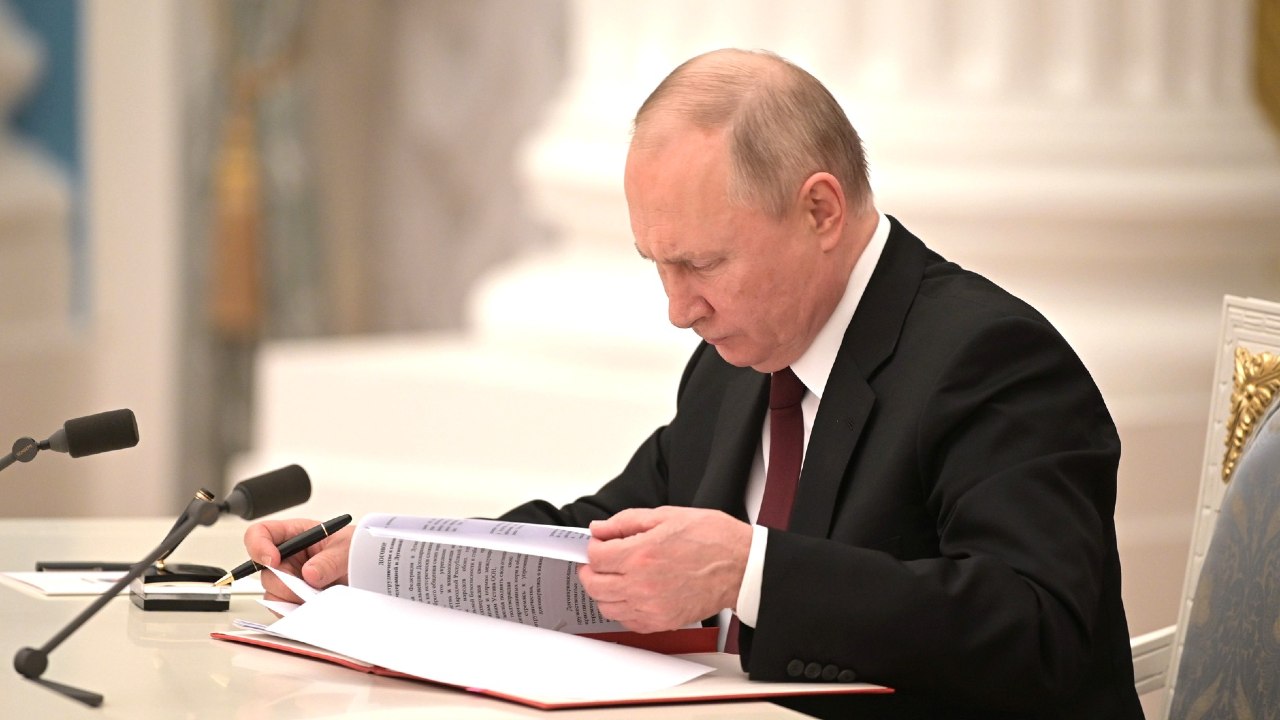In his hour-long “1984”-style speech Vladimir Putin effectively donned the mantle of the sole arbiter and ultimately as the re-maker of history and unifier of Russia’s “lost lands”, whose historic mandate is to right the wrongs inflicted, according to him, upon Russia over the last century.
Putin list of villains is long: short-sighted politicians within Russia itself, nefarious actors in the West, and most of all, by the Ukrainian nation and its leaders, through their continuous attempts to regain independence from Russia and by opposing Russia’s imperialist project in all of its forms.
Putin’s obsession with history, as French President Emmanuel Macron reportedly commented after their recent six-hour meeting, was center-stage in this speech, as the ruler of the Kremlin took Russia and the world on a rambling tour into his own disturbing perception of the perturbations of history from 1917 until present day. The speech was mostly about the past, but in it, Putin showed Ukraine, as well as Russia’s neighbors and the world, what their future would look like it he gets his way.
This is not the first time the ruler of the Kremlin has fulminated against the injustices that, in his view, even some of Russia’s own leaders, such as Lenin and his Bolsheviks, have inflicted upon Russia. During an academic conference in 2016 discussing Lenin’s legacy, he reportedly intervened to scold the speakers for glorifying the leader of the Bolshevik revolution who built the Soviet system with a constitutionally embedded right for Soviet republics to leave the Union at will.
Such designs were opposed by Joseph Stalin although (Putin moaned in his February 21 speech) he did not re-make the Soviet system after he took power, thus leaving nationalists within the Soviet republics, primarily those in Ukraine, with the legal opportunity to secede in the future.
If prior to the February 21 speech Putin’s attempts to impose his own views of history might have been considered a personal quirk aimed at domestic audiences only, his speech now has clearly demonstrated that his dangerous obsession with the past has multiple very tangible and direct implications for the current fate of Ukraine and the security architecture of Europe and the global order.
In words as well as his actions, Putin is motivated by three powerful forces that the entire civilized world thought had long been relegated to the most shameful chapters of the bloody 20th century. Revisionism, revanchism and irredentism (or revise, avenge and redeem) in political, legal and military terms compose are henceforth the three explicit elements of Putin’s modus operandi. In the grand scheme of things, Putin views the existing international order as fundamentally unjust to Russia and Western-centric, and actively seeks to revise it de jure by undermining its foundations de facto, beginning with depriving its neighbors, Ukraine first and foremost, of the sovereignty that he does not believe it possesses or even deserve, being merely the breakaway provinces of a once unified imperial Russia.
Putin’s revisionist views will push him toward further confrontation with the West as he seeks to re-establish Russia’s control over all of Ukraine as its perceived Russian “sphere of influence”, through a combination of salami-slicing land grabs and hybrid pressure on Ukraine’s government and society. On the ground in eastern Ukraine, this effectively means the end of Minsk and the return of Russia to the pre-2015 status quo of territorial expansionism, unfettered by the thin veneer of Russia’s quasi-legal commitments to the West.
With its hands untied, and the failed Minsk process “revised” by the fact of the announced recognition of the breakaway republics, their potential annexation by Russia Crimea-style (likely through a manipulated referendum), and the overt occupation of their territories by Russian troops, the Kremlin can move to step two, and seek revenge. At the strategic level the Kremlin will seek to punish the West for the claimed broken promises to not expand NATO eastward, by fomenting constant instability in Ukraine from the Russia-controlled Donbas, hoping that this would dissuade NATO from ever willing to allow Ukraine, as well as others, such as Georgia, to join. Putin will also seek revenge by punishing Ukraine’s nationalists.
“Now we will show you what de-Communization really means; why stop here?” he ominously stated, thus effectively threatening to deprive Ukraine of all those lands the Bolsheviks unjustly granted it a century ago — a process that did begin with Crimea in 2014, but will hardly be limited to the current territories of the current Donetsk and Luhansk puppet republics, as Putin’s speech clearly indicated.
This would inevitably usher in the third step — the attempts to redeem more such “lost territories” – first those in the Donbas over which Ukraine regained control in the summer of 2014, but potentially other Ukrainian regions, too, thus resuscitating the defunct Novorossiya separatist project.
In his 1984, George Orwell formulated the nefarious rationale of dictatorial regimes’ manipulation of history: “Who controls the past, controls the future: who controls the present, controls the past”. If Putin’s aggressive escalation against Ukraine remains un-condemned and most importantly — unchecked in the most decisive terms, moral, legal, economic and military — by the democratic West, not only the Kremlin will continue dismantling the Ukrainian state as it seems fit, but other autocratic regimes across the world will inevitably use Putin’s Orwellian model to justify their own landgrabs, thus collapsing the international order as we know it.
It is up to democracies to act now, decisively and swiftly at that, lest Putin’s glorified past become Ukraine’s (and ultimately, the world’s) dreaded future.
Mark Voyger is a Non-resident Senior Fellow with the Transatlantic Defense and Security Program at the Center for European Analysis. Now director of the Master’s Program in Global Management at the newly established American University Kyiv, he was previously Special Advisor for Russian and Eurasian Affairs to the Commanding General of US Army Europe.




